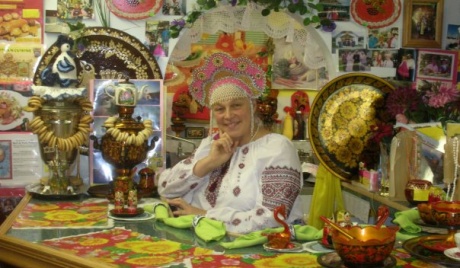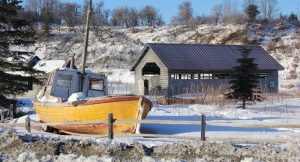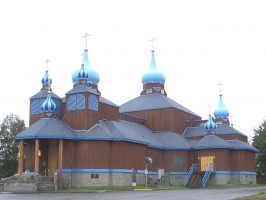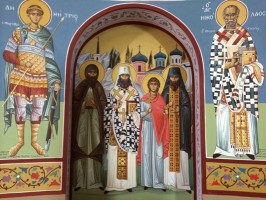Even though Alaska is now America’s land, a small part of Russian culture still exists today in a village called Nikolaevsk. The determination to keep their unique traditions alive and not fade away into history books is a question to be solved. Alaska was once Russian territory, and it has stagnating similarities to the Russia we all know today. Climate, landscape, and the popularity of fur are definite examples of how they are a mirror image of one another.
On the Kenai Peninsula, a village by the name of Nikolaevsk is what, around 400 hundred people, the majority of them Russian Orthodox Old Believers, call home. In history, it is said that every time Old Believers felt that their life style was threatened, they would pick up and move to a region where their religion could be practiced in isolation.
Fast forward to 2012, and Nikolaevsk, 10 miles east of Anchor Point, is still a village where traditions are taken seriously. The women wear blouses under a jumper, called a sarafan in Russian and are sometimes worn with an apron while the men appear in long shirts, or a rubashka, encircled with a belt. Girls of different ages can be seen adorning bright, colorful clothes with lively patterns on them.
The Old Believers split from the church in the 17th century because of some slight changes that were imposed. Oregon became their place of solace in the 60s and after half a decade in that area, part of the community moved away and settled down in Alaska. Their children wouldn’t be as culturally influenced by Americans in their new settlement, Nikolaevsk.
Old Believers stick to their regime, one being to wear the proper type of clothes. Some people may think they have gone back in time, once they encounter this lush village that has a surplus of forest area and warm welcomes.
Even though this village is a small dot compared to nearby towns like Anchor Point or Homer, they have all the amenities needed to be considered a functional village such as a post office, a school, and the one and only Samovar Café. Regardless of their accomplishments, problems persist in this part of Alaska. The Russian language is starting to vanish, as the younger generation is showing more distaste toward it.
“Of course Russian language I think will be gone from this generation because they speak in English at home. Parents don’t talk with them because they don’t understand them. If parents would talk with their children [in Russian at home] it would be wonderful, but not so many parents talk with their children in Russian,” said Nina Fefelov, a now retired Russian language teacher living in Nikolaevsk since 1991, to the Voice of Russia, “Several years ago, it was taught to 12 grade but now it’s only kindergarten to 5 grade,” added Fefelov who used to teach children Russian with her special program, which included watching Russian cartoons such as Nu Pogodi and Kot Leopold.
Razdolna, Voznesenka and Selo, the other prominent Old Believer villages are having a better off time speaking Russian with their children at home than Nikolaevsk, a sad but true fact. Fefelov, owner of the Samovar Café, goes on to talk about how funding had been cut, the Russian program in the Nikolaevsk school went from 1 hour lessons, down to 25 minutes a day, barely enough to help these children develop the skills they need. Issues of this nature may not seem like a big deal, but students come from Anchor Point to learn Russian in the Nikolaevsk School, expecting to become bilingual. The question remains of who will continue on with the traditions from their village, since the adolescents here really don’t have any degree of interest.
“Our village has our special Russian culture, people here want to save traditions, especially with clothes and they keep religion, how this religion was before. This is like a big family here,” explained Fefelov who used to be an electrical engineer in Russia but moved to Nikolaevsk after marrying her husband.
Many children are said to not even attend church, since the ceremony is done in the old Slavic language, something they can’t even understand. Their culture and religious traditions are being threatened by the changing ways of the world, and are allowing computers and TVs in their lives. Such add-ons are altering the way Old Believers perceive the world, and this may be a contributing factor as to why the children aren’t as accepting of their environment.
As they say all good things must come to an end, however as adults in Nikolaevsk wish to preserve the Russian language and the culture surrounding it, more children oppose the entire idea. They are pressured by modern day society to wear trendy clothes and speak English, something their surroundings can’t offer them.
Adolescents here are at a crossroads between keeping the tradition alive or letting it become just another page in the history books. The choice is theirs and only time will give Nikolaevsk residents the answer to their burning question: will our language, culture, and way of life stand to live through another generation? Well Nikolaevsk, the world will just have to wait and see, what becomes of the simple village nestled in southern Alaska.
Source: Voice of Russia




















